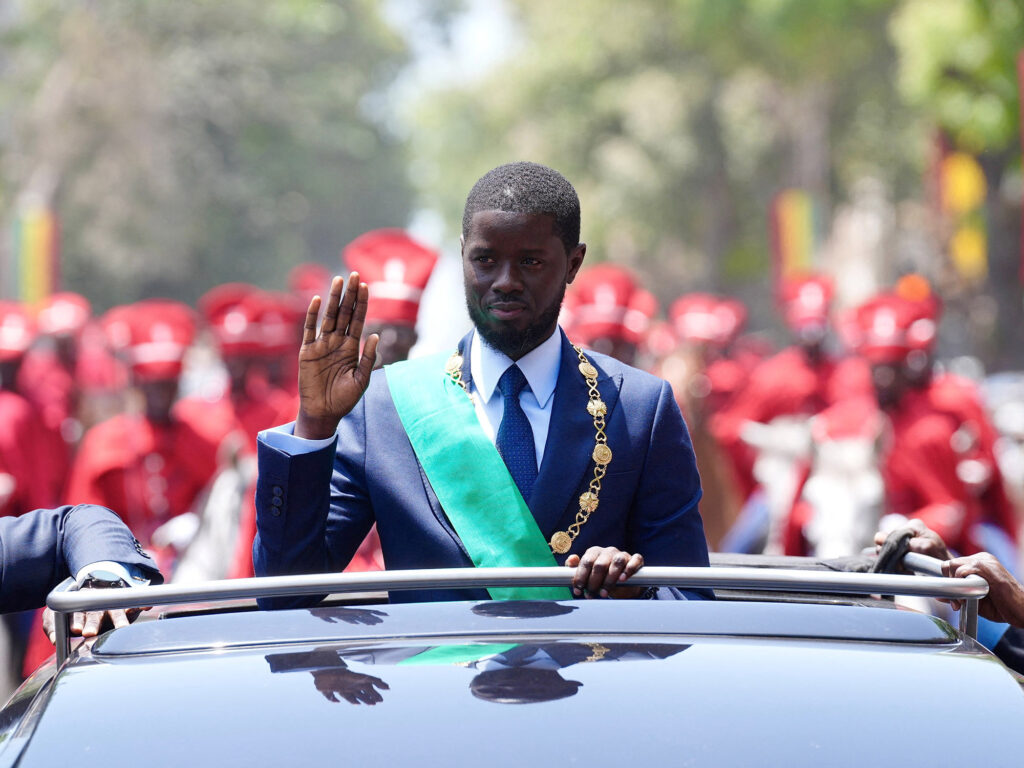On April 2, Bassirou Diomaye Faye was sworn in as Senegal’s fifth president, kicking off what some hope will be a transformative presidency.
Faye’s impressive first-round win over his main challenger and former Prime Minister Amadou Ba was met with messages of congratulations from international partners such as France, the United States, and the United Kingdom, with French President Emmanuel Macron even tweeting in Wolof, the most prominent of Senegal’s national languages. Macron’s overture was widely seen as an outstretched hand from a country that was often on the receiving end of Faye’s campaign rhetoric.
It is true that some in Faye’s coalition of self-styled left-wing pan-Africanists have called for Senegal to break from its traditional relationship with France. Faye himself has promised to renegotiate oil and gas contracts with foreign operators to reach more favorable terms, which has garnered attention in Western diplomatic circles.
Yet, early indications suggest that fears about Senegal severing its relationship with its foreign partners may have been overblown, as Faye has emphasized the importance of maintaining strong international relationships while focusing on domestic priorities.
In one of his first public appearances as president-elect, Faye called upon the countries that seceded from the Economic Community of West African States (ECOWAS) at the start of the year—Niger, Mali, and Burkina Faso—to return to the regional economic union. In his inaugural speech, Faye promised once more that Senegal would remain a friendly country for international partners rather than a confrontational one.
This complex reality has opened a window for countries in the West to establish more tightly knit relationships with Senegal and the region—but only if they’re willing to create equitable partnerships that foster development and stability.
Embracing change: Senegal’s transformation and Western relations
Faye’s victory clearly reflects frustration among the youth in Senegal, where high unemployment rates have been a pressing issue. According to data from 2023, youth unemployment in Senegal stood at around 4.2 percent. But with 84 percent of employment in the informal sector, many people under age thirty-five live in a precarious situation, with very little access to education, formal employment, or basic necessities.
This is why Faye’s determination to reform the economy, introduce anti-corruption measures, and promote national companies to enhance Senegal’s control over its natural resources has struck a chord with young people in urban areas, the disenfranchised, and older intellectuals who always viewed Senegal’s friendly relationship with the West as problematic. These policy goals address the demands of citizens for a fairer and more transparent system that can provide them with better prospects for economic stability and good governance based on merit, accountability, and integrity.
This represents a golden opportunity for Western countries to redefine their engagement strategy in Senegal and help stem the hostile narrative against them in the region. By supporting the fight for transparency, job creation, and the growth of a strong national private sector through technical and financial cooperation, the West can demonstrate its commitment to a more equitable partnership that benefits both Senegal and the Western countries involved.
Moreover, the windfalls from Senegal’s newly discovered oil and gas reserves will, from this year onward, completely transform the economic and social outlook of the country. Through constructive dialogue on issues such as natural resource management and sustainable development, Western interests can actively support a mutually beneficial partnership with Senegal.
The mining industry serves as a cautionary tale for how Western economic engagement with Senegal can lead to anti-Western backlash when the needs of locals are not considered. The expansion of the mining industry has caused forced evictions and damaged livelihoods. Over the past decade, local communities have led a number of protests, some turning violent and deadly, over the practices of these mining companies. This highlights the importance of ensuring that foreign economic activity respects the rights and livelihoods of local communities if anti-Western sentiment in Senegal is to recede.
Opportunity to reshape alliances in the Sahel
Initially met with apprehension abroad due to his antiestablishment stance, Faye’s presidency gained acceptance as his commitment to transparency, humility, and anti-corruption measures became evident, prompting a shift in the international community’s perception of him.
As further proof of this increased confidence, the price quoted on Senegal’s bonds due in 2048 rose by 1.4 cents to 75.88 cents on the dollar on the day following the election, the best performance for that day among sovereign dollar-debt issuers in emerging markets. This postelection bounce suggests a new cautious optimism from investors about the governance and economic outlook under Faye’s leadership.
This optimism could translate to acceptance of Faye’s positions on regional diplomacy: advocating a sovereigntist ideology; calling for Niger, Burkina Faso, and Mali to return to ECOWAS; promoting African integration; and challenging the use of the CFA franc. These positions starkly contrast with former President Macky Sall’s approach of seeking ECOWAS consensus before defining Senegal’s position on regional issues.
Faye also demonstrated his commitment to regional integration by exclusively inviting key African dignitaries to his inauguration, including Nigerian President Bola Tinubu, Moroccan Prime Minister Aziz Akhannouch, and Guinean Interim President Mamadi Doumbouya.
This shift in diplomatic strategy under Faye’s leadership presents an opportunity for Western countries to collaborate closely with Senegal on issues of African integration to reset and reshape relations with the countries that have distanced themselves from ECOWAS. Such partnerships would improve stability and economic cooperation in a region increasingly marked by great power politics.
Faye’s brand of left-wing pan-Africanism not only aligns with his vision for Senegal’s national sovereignty and economic empowerment but also presents an opportunity for Western countries to engage in a more equitable partnership that fosters development and stability in Senegal and the broader Sahel. As Senegal navigates this transition, the international community has the chance to prove it is serious about meeting this administration halfway. If it does, a new era of cooperation and shared prosperity in the region is a real possibility. If it doesn’t, then the West’s declining popularity in the region is likely to become a permanent trend.

